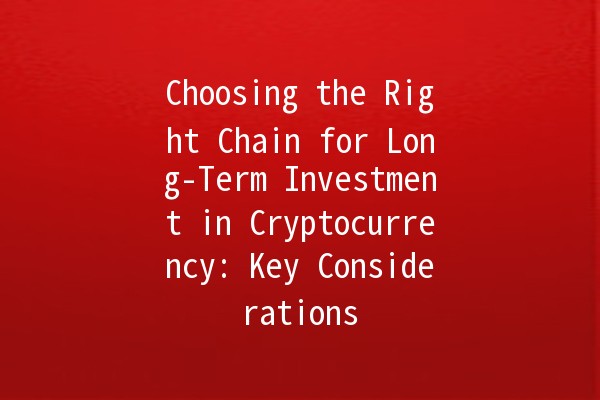
Investing in cryptocurrency has become an increasingly popular venture for many individuals looking to enhance their financial portfolios. However, with the vast array of blockchain platforms emerging in the market, discerning which blockchain to invest in for longterm benefits can be a daunting task. This article delves into the critical factors to consider when selecting the appropriate blockchain for longterm cryptocurrency investments, providing actionable tips and strategies to help you make informed decisions.
Understanding Blockchain Technology

Before diving into the specifics of selecting a blockchain, it's important to understand what blockchain technology entails. At its core, a blockchain is a decentralized digital ledger that records transactions across multiple computers, ensuring the integrity and security of data without the need for a centralized authority. This foundational technology underpins various cryptocurrencies and allows for transparent, immutable transactions.
Key Characteristics of a Good Blockchain
When evaluating different blockchains for investment purposes, consider the following characteristics:
Selecting the Right Chain: Practical Tips
Now that you have a basic understanding of blockchain technology, let’s explore five practical strategies to enhance your productivity when choosing the right blockchain for longterm investment.
The project's whitepaper is a fundamental document that outlines the technology, functionality, and roadmap of a blockchain project. It's akin to a business plan for the cryptocurrency. When evaluating a blockchain, meticulously read its whitepaper to determine:
Clarity: Is the technical and nontechnical information presented in an understandable manner?
Feasibility: Do the proposed solutions seem realistic and achievable?
Innovation: Does the project introduce unique features that distinguish it from competitors?
For example, Ethereum’s whitepaper famously detailed its vision for smart contracts, which has driven its adoption and innovation within the DeFi (Decentralized ance) space.
The overall ecosystem of a blockchain can greatly influence its potential for longterm growth. An ecosystem includes the array of applications, coins, and decentralized platforms operating on the blockchain.
Tips for evaluation:
Partnerships: Review any partnerships with established companies and their potential contributions.
Popularity: A higher number of DApps (Decentralized Applications) indicates active usage and demand.
For instance, the Binance Smart Chain has gained traction due to its strong ecosystem of exchanges, DApps, and DeFi projects, thereby enhancing its value proposition.
Investing in cryptocurrencies involves certain regulatory risks, hence it's important to research whether the blockchain project adheres to local and international regulations. Key aspects to consider include:
KYC/AML Policies: Does the project comply with Know Your Customer (KYC) and AntiMoney Laundering (AML) regulations?
Legal Status: Has the project been scrutinized by regulatory bodies, and what is the outcome?
A blockchain that prioritizes regulatory compliance not only mitigates investment risks but also enhances user trust.
A vibrant community and active developer engagement are strong indicators of a blockchain's longevity. Here’s how to gauge this:
Online Presence: Check forums, social media platforms, and community groups for discussions and topics related to the blockchain.
GitHub Activity: A project’s GitHub page can provide insights into the frequency of updates, bug fixes, and overall development activity.
A great example is Cardano, known for its strong community initiative and academic backing, which has proven beneficial for its growth.
Understanding the current market dynamics can greatly impact your investment decisions. Keep an eye on:
Market Capitalization: A higher market cap often indicates greater stability, which can be important for longterm investments.
Price Movements: Analyze patterns and trends in price movements to gauge investor sentiment.
Using tools like CoinMarketCap can help track these trends and give insights into potential market changes.
Frequently Asked Questions
Before investing, assess the project's whitepaper, evaluate its ecosystem, check for regulatory compliance, gauge the level of community engagement, and monitor market trends. These elements will inform your decision on the suitability of each blockchain for longterm investment.
Research the team's background, assess the project's transparency, look for active community engagement, and avoid projects with unrealistic promises. Review platforms like GitHub to analyze the development activity associated with the project.
While no investment is riskfree, established blockchains with strong community support and significant adoption are generally regarded as safer. Examples include Bitcoin, Ethereum, and Binance Smart Chain.
Regularly reviewing your investments—ideally every few months—allows you to stay informed on developments within the blockchain space. This can help you adjust your portfolio based on new information or changing market conditions.
Security is paramount in the cryptocurrency space. Assessing the blockchain's history of hacks, its consensus mechanism (proof of work vs. proof of stake), and ongoing efforts to enhance security are crucial factors in minimizing risk.
Diversification can mitigate risk, so investing in multiple blockchains may yield a more balanced portfolio. However, ensure that you're knowledgeable about each blockchain to make informed decisions, as spreading yourself too thin may limit your potential for effective management.
Choosing the right blockchain for longterm investment requires careful consideration of various factors, including project viability, ecosystem strength, regulatory compliance, community support, and market trends. By employing practical strategies and remaining vigilant in your research, you can enhance your ability to make informed investment decisions and navigate the evolving landscape of cryptocurrency with confidence.

